Ctrl + F is the shortcut in your browser or operating system that allows you to find words or questions quickly.
Ctrl + Tab to move to the next tab to the right and Ctrl + Shift + Tab to move to the next tab to the left.
On a phone or tablet, tap the menu icon in the upper-right corner of the window; Select "Find in Page" to search a question.
Share UsSharing is Caring
It's the biggest motivation to help us to make the site better by sharing this to your friends or classmates.
Respiratory Care Science
Delves into the study of the respiratory system and on diagnosing, treating, and managing respiratory disorders to improve patient health and well-being.
respiratory
care
science
lung
breathing
ventilation
oxygenation
pulmonary
disease
therapy
respiratory system
inhalation
exhalation
airway
respiratory disorders
What condition is caused by allergens that may generate itchiness, watery eyes and swollen eyelids
- Asthma
- Allergy
- Common Cold
- Flu
What do you call the tiny hair-like structures inside the nasal cavity that filters dust and dirt from the air we breathe?
- flagella
- vellus hair
- cilia
- nostrils
It is the inflammation and swelling of the mucous membrane of the nose, characterized by a runny nose and stuffiness and usually caused by the common cold or a seasonal allergy.
- Tonsilitis
- Sinuses
- Rhinitis
- Common colds
Act of taking air in and out of the lungs.
- Breathing
- Internal Respiration
- External Respiration
- Cellular Respiration
The nurse teaches an adolescent who has had a tonsillectomy which of the following?
- Avoid coughing and cleaning the throat the first week postoperatively.
- Do not eat or drink anything for the first 24 hours.
- If your stool is black for the first few days postop, notify the doctor.
- Avoid cold beverages to prevent irritation of the throat.
What blood vessel surrounds the alveoli and absorbs the air that we breathe?
- Capillaries
- Veins
- Arteries
Pharynx is also known as the _______.
- throat
- windpipe
- voice box
Pleurisy is the inflammation of the _______.
- lungs
- trachea
- alveoli
- pleura
When we inhale:
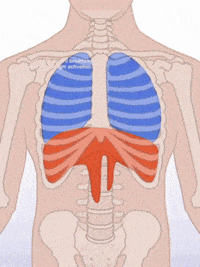
- The diaphragm contracts (becomes smaller)
- Lungs become big and inflated
- The diaphragm relaxes (becomes bigger)
- Lungs or thoracic cavity decrease in size
Structures in the nose that trap bacteria and dirt
- pores
- cilia
•At the bottom of the cavity is a large, flat muscle known as the _____________.
- diaphragm
measure the maximum amount of air a person can exhale after taking a deep breath
- vital capacity
Your patient Kelly has a blood pressure reading of 115/80 mmHg. You tell her:
- Your blood pressure is just fine!
- Careful - your blood pressure is dangerously low.
- Watch your cholesterol intake; your blood pressure is higher than normal.
Which of the following will the nurse interpret as positive Mantaux test?
- Redness greater than 5mm.
- Swelling greater than 7mm.
- Induration greater than 20mm.
- Exudates covering more than 12mm.
shortness of breath. Damaged air sacs in the alveoli
- emphysema
- asthma
- pneumonia
- apnea
What part of the respiratory system is known as the voice box?
- Pharynx
- Trachea
- Larynx
- Bronchi
Blood pressure is a measure of the force of blood on the walls of the arteries.

- True
- False
Is one of the leading causes of cancer related deaths among men and women.
- Lung Cancer
- Influenza
- Common Cold
- Pneumonia
Which of the following additional assessment data should immediately be gathered to determine the status of a client with a respiratory rate of 4 breaths/minute?
- ABG and breath sounds
- Level of consciousness and a pulse oximetry values
- Breath sounds and reflexes
- Heart sounds and reflexes
Tonsils are part of the larynx.
- TRUE
- FALSE
What do you call the process of taking out air from the lungs?
- exhalation
where gas exchange occurs
- alveoli
What would be the best advice for this man, who has hypertension?
- Don't consume so much sugar.
- Try to reduce the cholesterol in your diet.
- Get more sleep each night.
Which of the following would be considered most normal in the water - seal chamber withig the first 24 hours postoperatively with a two-bottle water-seal drainage?
- No fluctuation in the water - seal tube
- Intermittent, slight bubbling from the water-seal tube
- Bright-red blood bloody drainage
- Continuous bubbling in the water-seal tube
A condition in which your airways narrow and swell and produce extra mucus. This can make breathing difficult and trigger coughing, wheezing and shortness of breath.
- Flu
- Common cold
- Allergy
- Asthma
What happens to the diaphragm during exhalation?
- Stays the Same
- Moves downard
- Relaxes
- Contracts
The Upper Respiratory System has three parts namely: Nasal Cavity, Pharynx, and _______________.
- Larynx
5. X is...
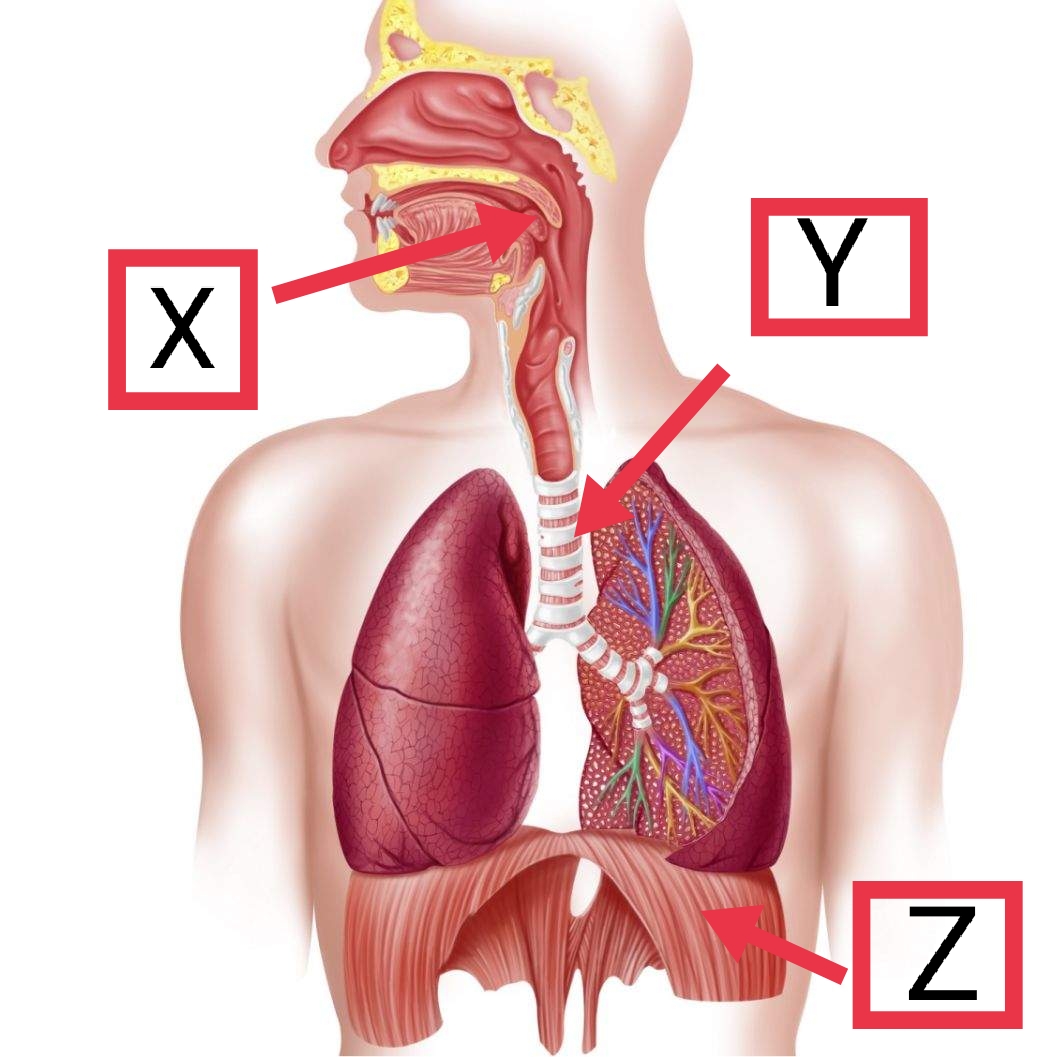
- Pharynx
The client had undergone total laryngectomy. He has permanent tracheostomy. Which of the following action needs intervention during tracheal suctioning?
- The nurse dons sterile gloves and uses sterile suction catheter.
- The nurse administers 100% oxygen before and after the suctioning.
- The nurse applies suction for 30 seconds at a time.
- The nurse applies suction during withdrawal of the suction catheter tip.
Veins carry oxygen-rich blood away from the heart.
- True
- False
What internal respiration serves for?
- Generate Carbon Dioxide
- Generate Carbon Monoxide
- Generate ATP
- Generate nails
- Generate the trachea
Inside the lungs, the bronchi divide into smaller tubes. At the end of these tubes, there are tiny sacs called...
- Pharynx
- Trachea
- Lungs
- Alveoli
6. Y.......?
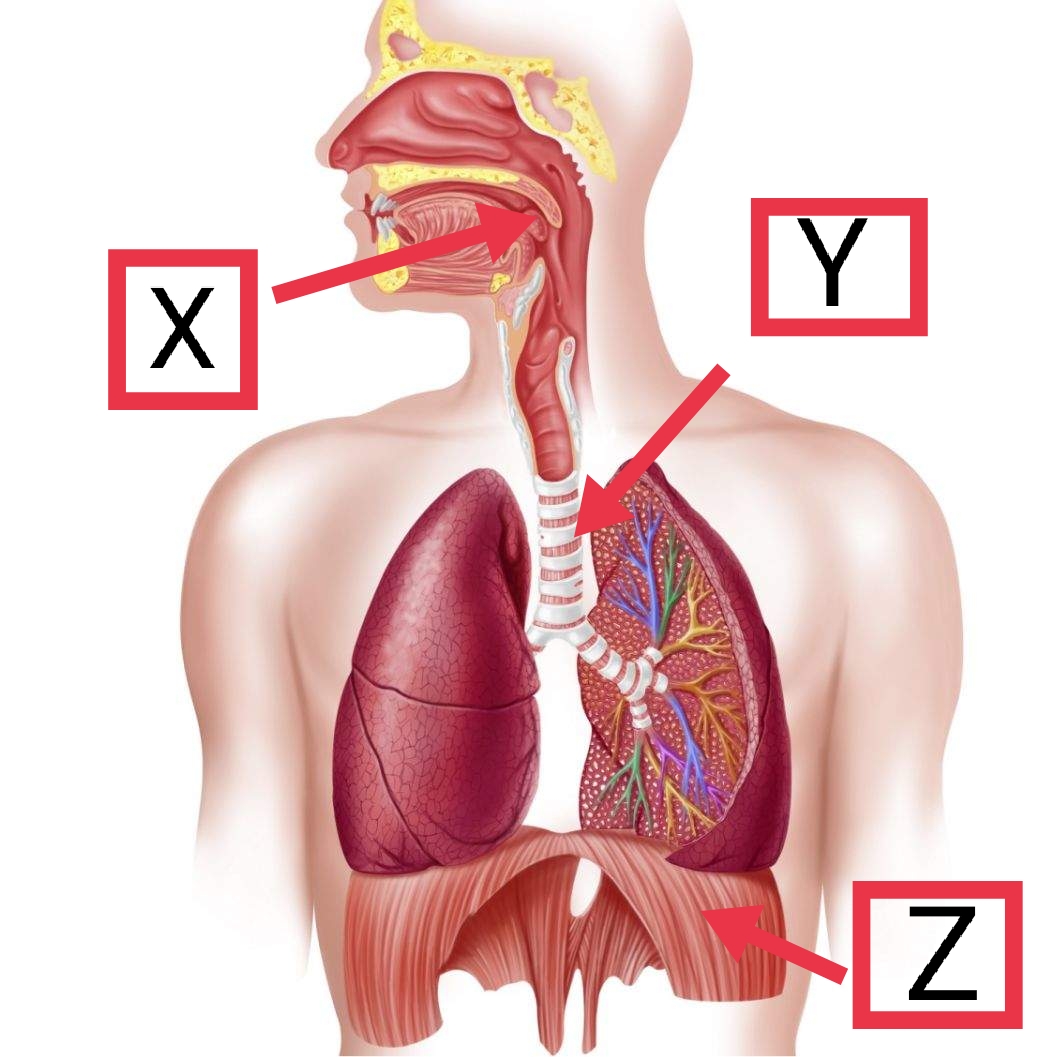
- Trachea
internal respiration
- happens in the lungs
- happens in the tissues
A nurse is reviewing the ABG values and notes a pH of 7.42, a PCO2 of 55 mm Hg, and a HCO3 of 24 mEq/L. What does the nurse interpret these values as?
- Uncompensated respiratory alkalosis
- Compensated respiratory alkalosis
- Compensated respiratory acidosis
- Uncompensated respiratory acidosis
One of the functions of Respiratory system is to takes up oxygen from air and supplies it to blood (for cellular respiration).
- TRUE
- FALSE
A 70-year old patient calls 911 because she is worried about strange symptoms she has been having for the last 20 minutes. She cannot feel the right side of her body, and her vision is blurry. You tell her....
- You are having a stroke!
- You are having an asthma attack!
- You are having a heart attack!
The material found in the ears and tip of the nose that holds the trachea open
- cartilage
The patient is scheduled to have a pulmonary function test. Further instruction is needed when she states:
- " I should use my atenolol right away before the test."
- "I shouldn't smoke 6 hours beforehand."
- "I should only breathe through my mouth."
- "This test will help identify the cause of my shortness of breath."
- Atenolol is a bronchodilator that must be withheld 4-6 hours before the procedure as to not skew the results
It is a hair like structure that moves the mucus up and out of the body through sneezing and coughing.
- Cartilage
- Cilia
- Capillaries
- Sinus
It is located from the mouth until the
- lungs
What blood vessels are shown here?
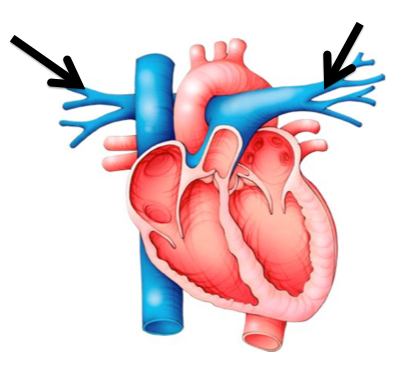
- Pulmonary veins
- Pulmonary arteries
- Aorta
- Descending aorta
9. What is the gas that diffuse and into the blood capillary?
- CO²
- O²
- CO
- SO²
While the nurse interviews a patient, he verbalizes that he has difficulty breathing during sleep and uses three pillows for relief. The nurse notes that he may be experiencing :
- Paroxysmal nocturnal dyspnea
- Orthopnea
- Hyperventilation
- Claudication
___________ are air sacs at the end of bronchioles where gas exchange takes place.
- ALVEOLI
Oxygen – carried in the blood + haemoglobin =
- oxyhaemoglobin
- carbaminohaemoglobin
Also known as the windpipe
- larynx
- pharynx
- trachea
- esohpagus
What is the site of gas exchange?
- alveoli
- nose
- lung
- bronchi
A nurse is monitoring a patient who has a chest tube drainage system and notices that there is gentle bubbling in the suction control chamber. What is the appropriate nursing action for this scenario?
- Document this finding.
- Check to see if the chest tube is blocked or kinked
- Check for an air leak
- Notify the physician immediately
In the alveoli, red blood cells gets the __.
- oxygen
What do you call the process of inhalation and exhalation?
- Respiration
Pharynx is also known as ________________
- Throat
Suggest 5 ways to improve your respiratory health. (5pts)1.2.3.4.5.
- [No Answer]
The drug of choice in the treatment of histoplasmosis is:
- Streptomycin
- Rifampicin
- Paraaminosalicyclic acid (PAS)
- Amphotericin B
1. What is the system that help us breathe?
- Respiratory System
- Excretion System
- Circulatory System
- Digestive System
What do you call the main muscle for respiration?
- diaphragm
the average respiratory rate is 12 to 15 breaths/minute
- true
- false
Which of the following describes an ANTIGEN?
- Virus
- Bacteria
- Dust
It is a cone-shaped passage way leading to trachea.
- Pharynx
- Larynx
- Bronchi
- Nasal Cavity
It is an acute inflammation of the lungs. Symptoms include high fever, chills, headache, cough, and chest pain.
- Pneumonia
- Lung cancer
- Bronchitis
- Emphysema
The respiratory system helps add carbon dioxide to the blood from the heart.
- True
- False
The part of the skeleton that protects the lungs
- ribs
What is/are the function/s of the respiratory system?
- to deliver oxygen from different organs
- to remove carbon dioxide from the body
- to get oxygen from the environment
- to collect carbon dioxide from different organs
suspension of breathing. There is no movement of muscles of inhalation and the volume of the lungs initially remains unchanged
- emphysema
- asthma
- pneumonia
- apnea
How are the left lung and right lung different from each other? (2pts)
- [No Answer]
The disease causes inflammation of the lungs' air sacs, which become filled with pus or fluid
- Tuberculosis
- Pneumonia
- Emphysema
- Lung Cancer
How do organisms obtain oxygen?
- by process of blood transfusion
- by process of ingestion and digestion
- by process of gas exchange
- by process of excretion
What part of the Respiratory System allows the exchange of gases?
- alveoli
A 52 yera old client is being discharged following laryngectomy for cancer of the larynx. Prior to discharge, the nurse assesses the following psychomotor skills:
- Administering injections, changing dressing and chest physiotherapy
- Taking the blood pressure, pulse rate and monitoring serum glucose
- Suctioning and caring for tracheostomies and tracheostomy tube
- Tube feeding, taking aerosol medications and taking blood pressure
Each bronchus leads into a lung and branches into smaller and smaller ______________, resembling an inverted tree.
- BRONCHIOLES
A heart attack usually occurs because:
- The alveoli are inflamed
- The coronary artery is blocked by a blood clot
- An artery in the brain bursts
A condition in which breathing is impaired by constriction of bronchi and bronchioles, cough, and thick mucus secretions.
- Asthma
- Bronchitis
- Emphysema
- Pneumonia
Carbon Dioxide– excreted and transported by the lungs + haemoglobin =
- oxyhaemoglobin
- carbaminohaemoglobin
A 74-year old is diagnosed with tuberculosis. Which of the following laboratory reports most accurately confirms the diagnosis?
- Chest X-ray
- Sputum culture
- Complete blood count
- Mantoux test
These structures produce a mucus that moisturizes the inside of the nose which protect the nose from pollutants, micro-organisms, dust and dirt.
- nasal cavity
- nostrils
- tonsils
- sinuses
voluntary (exhale); involuntary (inhale)
- true
- false
What is the normal number of breaths per minute?
- 12 to 16 with 2 seconds separation
- 30 to 35 with 4 seconds separation
- 10 to 18 with 2 seconds separation
- 5 to 8 with 5 seconds separation
- 10 to 18 with 4 seconds separation
– inflammatory condition of lungs affecting primarily the alveoli (may tubig sa lungs)
- emphysema
- asthma
- pneumonia
- apnea
The other name for Wind Pipe
- Trachea
- Larynx
- Diaphragm
- Bronchioles
Which chamber of the heart is shown here?
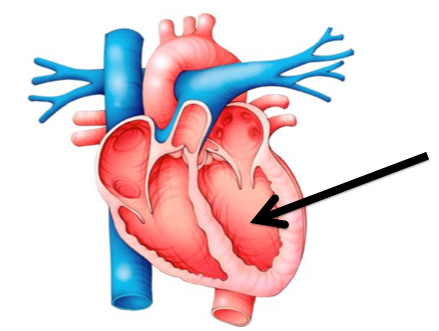
- Right atrium
- Right ventricle
- Left atrium
- Left ventricle
Taylor has type O+ blood and needs a blood transfusion. What kinds of blood could she receive?
- A- and O-
- O- and O+
- A-, A+, B- and B+
A patient with a chronic lung disease arrives on the med-surg unit. Which delivery system would offer the most precise oxygen concentration for this patient?
- Nonrebreather
- Venturi facemask
- Nasal cannula
- Face tent
Which of the following is a normal finding in the aging adult?
- Anteroposterior diameter increases
- Residual volume decreases
- Airways close late
- Ability to cough increases
A person who has B antigens present but no Rh antigens would be:
- B-
- A+
- B+
What do you call a system responsible for breathing?
- Respiratory System
Which is NOT a symptom of a heart attack?
- Shortness of breath
- Pain in the chest area
- Slurred speech
While assessing a trachostomy patient, the nurse notices that there is a crackling sensation around the neck. The nurse suspects this complication as:
- Pneumothorax
- Tracheomalacia
- Subcutaneous emphysema
- Trachea-innominate artery fistula
7. Z is...
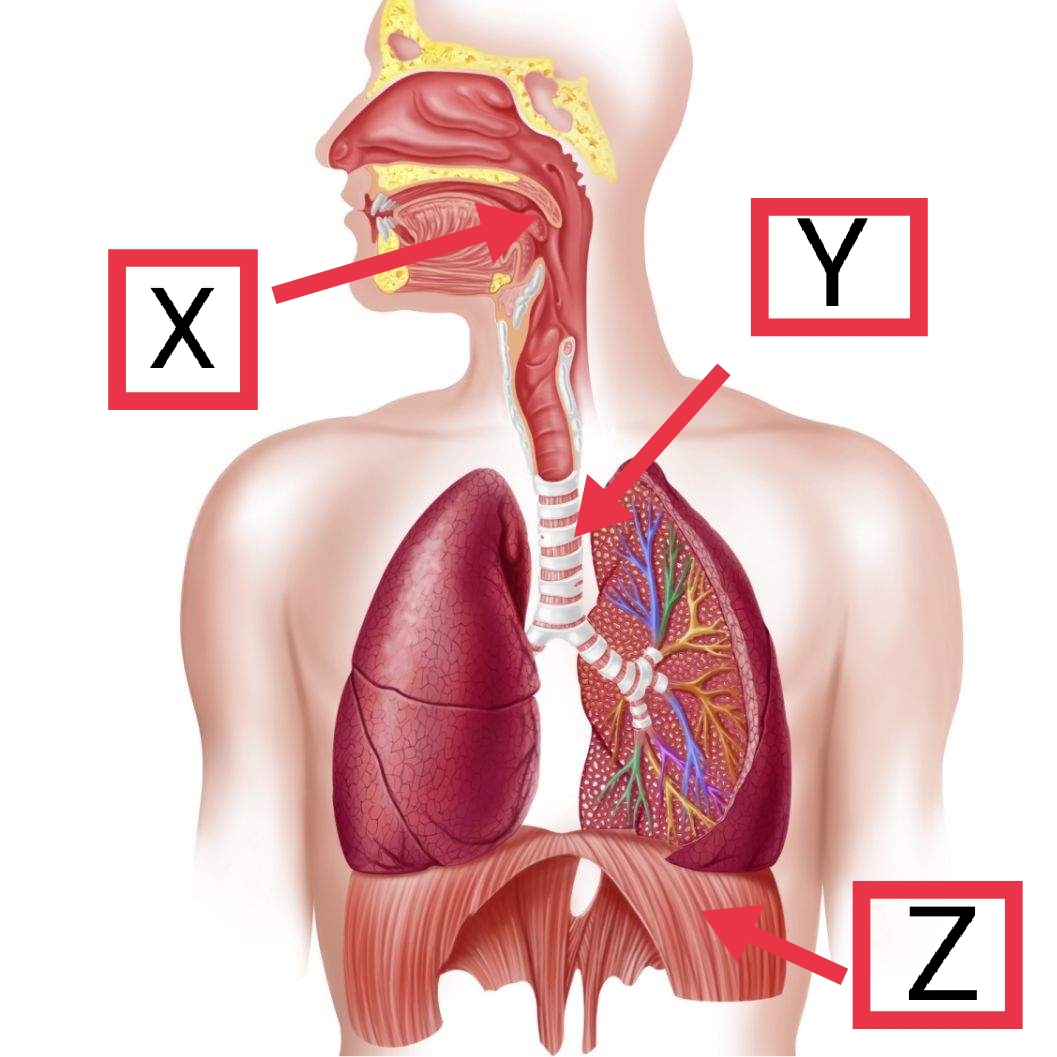
- Diaphragm
Colds do not have a cure, but its symptoms can be relieved by taking enough rest and drinking lots of fluids
- True
- False
Carbon dioxide in the blood diffuses into the alveolus.
- TRUE
- FALSE
A postop patient who had a bronchoscopy two hours ago is NPO and states that he is hungry. What should the nurse do?
- Notify the physician
- Calmly tell the patient that he must remain NPO until another four hours
- Order food since the patient is A&O
- Check for a gag reflex return
Lymphocytes are:
- A type of red blood cell that carries oxygen
- A type of white blood cell that fights viruses and bacteria
- A type of pathogen
Choose two things that happen during inhalation.
- ribcage becomes smaller
- lungs inflate
- ribcage becomes bigger
- diaphragm relaxes
The diaphragm separates the chest cavity from the abdominal cavity
- True
- False
Caused by inhaling tar in cigarrette smoke
- Bronchitis
- Lung cancer
- Asthma
- Respiratory infections
The patient below has hypertension. His BP is probably...
- 80/40 mmHg
- 120/80 mmHg
- 150/100 mmHg
A nurse is providing discharge instructions for a tracheostomy patient. Which statement indicates that the patient understands tracheostomy care?
- "I will increase the humidity in my home."
- "I can no longer have showers anymore."
- "Before suctioning, I should wash my hands."
- "If I stick a large cottonball in the airway, I won't be able to breathe."
A client with emphysema is observed to have labored breathing and exhibits slow, shallow respiration.. This endangers him to develop :
- Respiratory alkalosis
- Respiratory acidosis
- Metabolic alkalosis
- Metabolic acidosis
NUMBER 3:
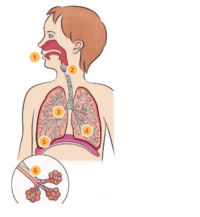
- Pharynx
- Trachea
- Bronchi
- Alveoli
What happens to the diaphragm during inhalation?
- Stays the Same
- Flattens
- Relaxes
- Contracts
Which blood vessel is shown here?
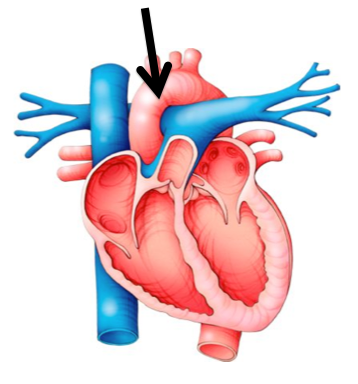
- Aorta
- Inferior vena cava
- Pulmonary artery
- Superior vena cava
What are the functions of the Respiratory System? List down at least 2 functions. (2pts)1.2.
- [No Answer]
When we breathe out, the ____________ leaves our lungs.
- Carbon dioxide
- Oxygen
The muscular structure that helps to expand and contract the lungs, forcing air in and out is the _______.
- biceps
- gluteus maximus
- abdomen
- diaphragm
Which clinical manifestation is the main sign of lung disease?
- Dyspnea
- Hemoptysis
- Cough
- Hoarseness
What do you call the flap of cartilage which prevents the food from entering the trachea?
- tonsils
- uvula
- epiglottis
- pharynx
8. What happens to diaphragm when we breathe in?2 answers.
- Contracts
- Relaxes
- Move upwards
- Move downwards
A nurse is caring for a patient who had a surgical placement of a tracheostomy 48 hours ago. What should the nurse's initial action be if tube dislodgement occurs?
- Re-insert the tube and notify the physician
- Place a 4x4 sterile gauze over the stoma to prevent infection
- Obtain the patient's vital signs
- Ventilate the patient using a manual resuscitation bag as another nurse notifies for help from the resuscitation team
The organ shown below is responsible for:
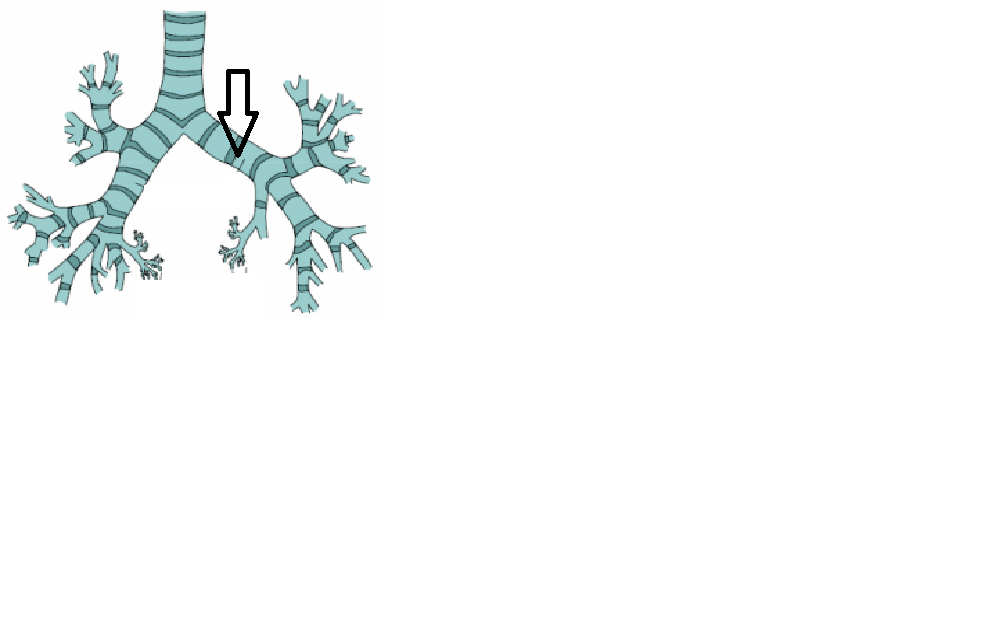
- Removing CO2 from the blood
- Bringing air into the lungs
- Causing the lungs to inflate
external respiration
- happens in the lungs
- happens in the tissues
Also known as the voice box that extends from the root of the tongue (very important for voice speech: vocal cords)
- larynx
- pharynx
- trachea
- esohpagus
acts as a trapdoor, which prevent from food and liquid entering the trachea during swallowing
- larynx
- pharynx
- trachea
- epiglottis
2. The gas we breathe out is...
- H²O
- O²
- CO²
- He
4. Where does diffusion happens?
- Bronchiole
- Nostrils
- Trachea
- Alveolus
A permanent and irreversible destruction of alveolar walls, resulting in loss of lung elasticity and gas exchange surface.
- Asthma
- Bronchitis
- Emphysema
- Pneumonia
Alveoli are not in clusters.
- True
- False
The blood vessels that carry blood to and from the lungs are called the p________________ artery and vein.
- pulmonary
The alveoli is lined with _?_ for gas exchange.
- Ciliated Cells
- Guard Cells
- Blood Capillaries
- Bronchi
What happens to the diaphragm when we inhale?
- it moves up
- it moves down
- it relaxes
A 53-year-old patient reports smoking two packs of cigarettes per day for the past 35 years. Calculate the pack-years for this patient.
- 17.5
- 35
- 70
- 106
The arrow below is pointing to the:
.png)
- Trachea
- Pharynx
- Diaphgram
An inflammation of the mucous membranes of the bronchi. May present with cough, fever, chest or back pain, and fatigue.
- Pneumonia
- Lung cancer
- Bronchitis
- Emphysema
What part of blood is shown here?
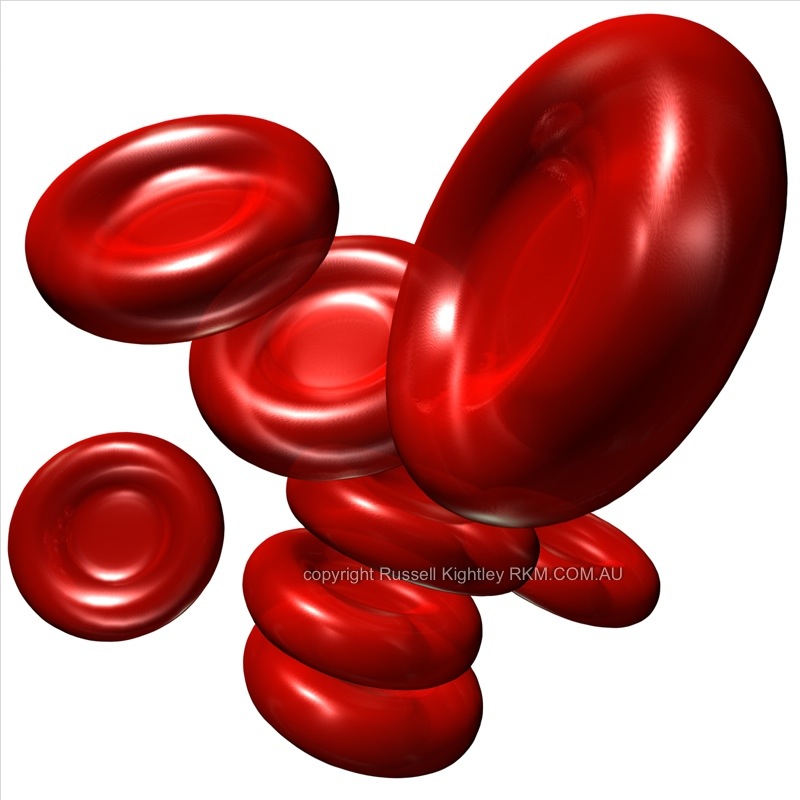
- Red blood cells
- White blood cells
- Plasma
Which respiratory illness is caused by an allergen like pet hair?
- tuberculosis
- asthma
- common colds
- bronchitis
We breathe in carbon dioxide and breathe out oxygen
- True
- False
the right lung is separated by what fissures?
- oblique fissure
- horizontal fissure
What is the other term for pharyngitis?
- sore throat
A nurse is administering oxygen to a patient who has hypoxemia and hypercarbia. Which oxygen delivery system is appropriate for this patient?
- Nonrebreather mask
- Nasal cannula at 2L/min
- Nasal cannula at 4L/min
- Simple facemask at 5L/min
10. What is the name of the process above?
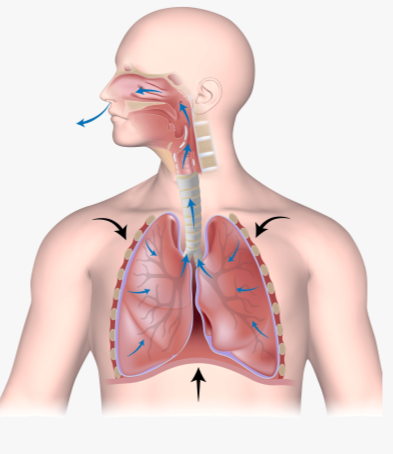
- Excretion
- Exhale
- Inhale
- Diffusion
Two short tubes that carry air into the lungs
- Trachea
- Bronchioles
- Lungs
- Bronchi
Where are lymphocytes found in the body?
- In the blood plasma
- In the muscles
- In the nerve cells
The nurse comes into the patient's room and discovers that the patient's pulse oximetry reading is 91%. The nurse should first:
- Notify the Rapid Response Team
- Assess the patient's respiratory status
- Apply supplemental oxygen
- Place patient in high-Fowler's position
Also known as flu. Cause by a virus that attacks your respiratory system — your nose, throat and lungs.
- Influenza
- URTI -Cold
- Pneumonia
- Bronchitis
thicker, wider and shorter bronchus
- right bronchus
- left bronchus
The nurse is suctioning a patient with an endotracheal tube. Which of the following is a correct technique for this procedure?
- Suction for 5 seconds
- Apply suction during insertion
- Suction the mouth before suctioning the airway
- Hyperoxygenate before and after suctioning
Intersection where pathway for air and food cross. Most of the time, the pathway for air is open, except when we swallow is called ___________________.
- Pharynx
Larynx is also known as ___________________
- Voice Box
receives air from the nasal cavity and air, food, and water from the oral cavity
- larynx
- pharynx
- trachea
- esohpagus
What Happens during Aerobic respiration?
- Releases energy from glucose (sugar from the food we ate)
- Produces lactic acid in animals
- Uses Oxygen
- Takes place in humans during strenuous exercise.
__________ exchange takes place in the alveoli.
- Gas
The organ shown below is the:
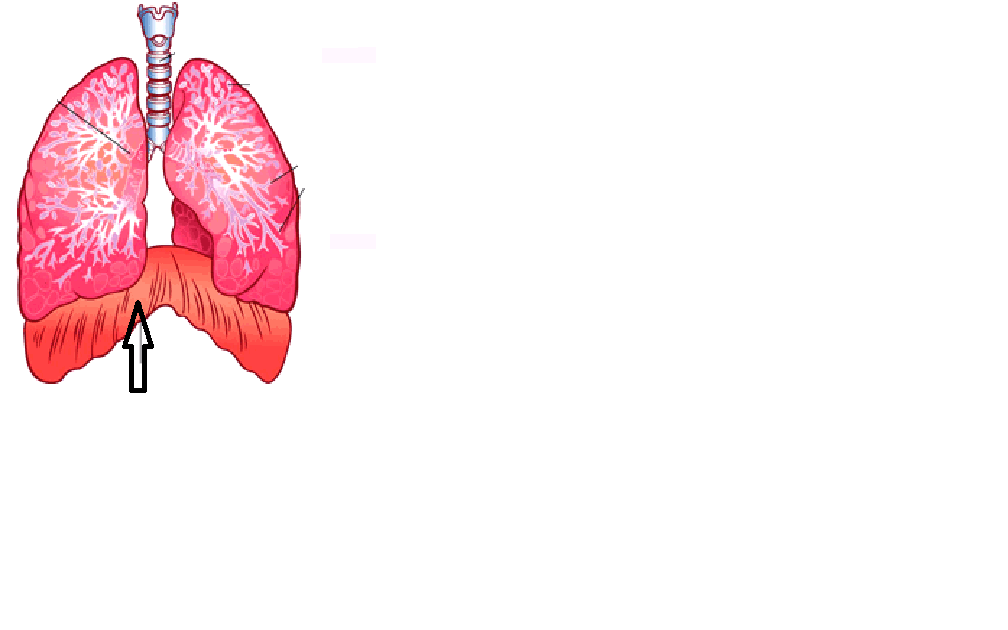
- Diaphragm
- Trachea
- Pharynx
What blood vessel is shown here?
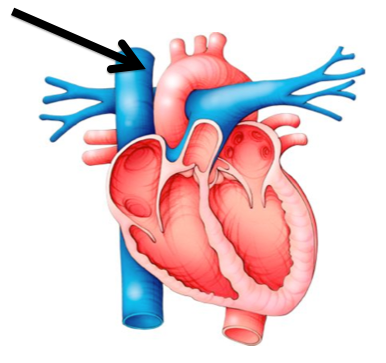
- Aorta
- Superior vena cava
- Pulmonary artery
- Pulmonary vein
It is a cancerous growth that invades and destroys lung tissue.
- Pneumonia
- Lung cancer
- Asthma
- Emphysema
The process of using oxygen to break down sugar in food, producing energy (ATP) in cells and releasing carbon dioxide as a waste product.
- Breathing
- Internal Respiration
- External Respiration
- Cellular Respiration
What aspiration precaution measures should the nurse implement to the 78-year-old patient with a tracheostomy? (Select all that apply.)
- Instruct patient to drink water, especially while chewing
- Keep patient at low-Fowler's position
- Do not rush patient
- Deflate cuff during meals
- Provide large meals
A 37-year-old patient is admitted to the ED with dyspnea, tachypnea and pink, frothy sputum. The nurse determines that the patient is experiencing:
- Lung abscess
- Neck trauma
- Cor pulmonale
- Pulmonary embolism
NUMBER 2:
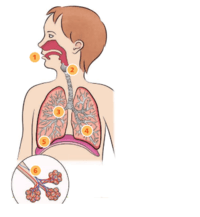
- Pharynx
- Bronchi
- Alveoli
- Lungs
_____________ is the actual mechanical intake of air.
- Breathing
What are Bronchioles?
- Subdivisions of bronchi
- Part of the trachea
- Where gas exchanges happen
- Cartilages of the larynx
- Parts of the diaphragm
What is the importance of the hair in the nose?
- [No Answer]
The pharynx contains vocal cords, which allow us to make sounds by voluntarily tensing muscles.
- TRUE
- FALSE
COPD means _____________________________
- Chronic Obstructive Pulmonary Disease
Is an infection that inflames the air sacs in one or both lungs. The air sacs may fill with fluid or pus
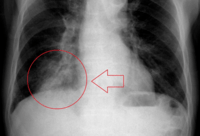
- Emphysema
- Pneumonia
- Influenza
- Tuberculosis
Which is the correct passage of air from the environment to the inside of the body?
- nose, lungs, trachea, bronchi
- trachae, nose, bronchi, lungs
- nose, trachea, bronchi, lungs
- trachae,bronchi, lungs, nose
NUMBER 6:
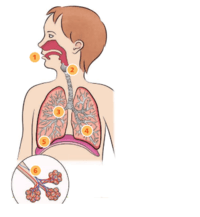
- Lungs
- Trachea
- Mouth
- Alveoli
Before starting on Isoniazid (INH), a client will probably have which of the following laboratory tests?
- AST and ALT
- BUN, serum creatinine
- Serum glucose level
- Blood uric acid level
Flu is a contagious illness caused by several influenza viruses.
- True
- False
Kristina has type AB blood. She was in a major car accident and needs a blood transfusion! Which blood types can she receive?
- A and B only
- A, B, AB and O
Which part is the site of gas exchange?
- nostrils
- bronchi
- trachea
- alveolus
As the nurse auscultates the patient, she hears a popping, discontinuous sound over the lung fields. This type of adventitious sound is known as:
- Wheezes
- Crackles
- Resonance
- Pleural friction rub
The respiratory system is a part of the
- autonomic nervous system
____________________ are also called the air sacs.
- Alveoli
Given the following structures:1. larynx2. nasal cavity3. pharynx4. tracheaWhich of the following is the correct order that air would flow during inhalation.
- 1,2,3,4
- 2,3,1,4
- 2,1,3,4
- 4,2,3,1
Intercostal muscle helps gas exchange by causing the ribs to move out allowing the lungs to fill with air
- True
- False
What are the first defense of the Respiratory System against foreign debris entering the body?
- Antibodies
- Blood
- Skin
- Cilia and Mucus
What is the first part of the respiratory system?
- Pharynx
- Larynx
- Mouth
- Nose
- Trachea
Give 1 way of taking care of respiratory system
- [No Answer]
A client has active TB. Which of the following clinical manifestations will he exhibit?
- Chest and lower backpain
- Headache and fever
- Fever, night sweats, chills, hemoptysis
- Fever of more than 140F and nausea
A nurse is caring for a patient who had a thoracentesis eight hours ago. While assessing the patient, the nurse observes that the patient has a rapid heart rate, rapid, shallow respirations, and has absent breath sounds to the left upper lobe of the lung. The nurse interprets this complication as:
- Pulmonary embolism
- Pneumothorax
- Respiratory distress
- Flail chest
Which of the following breathing techniques does the nurse teache a client with pulmonary emphysema that will assist in exhalation?
- Push on abdomen during exhalation.
- Sit in high-Fowler's position with legs extended
- Lean forward 30 to 40 degrees with each exhalation.
- Sit up with shoulders back.
the left lung is separated by what fissures?
- oblique fissure
- horizontal fissure
The nurse enters the room of a client with COPD. The client's oxygen is running at 8L/min. The nurse's best initial nursing action is:
- Check the doctor's order
- Lower the oxygen rate at 2L/min
- Take the vital sign
- Put the client in Fowler's position
Which helps fight against viruses and bacteria?
- Red blood cells
- White blood cells
- Plasma
A person with asthma uses this because it helps to:
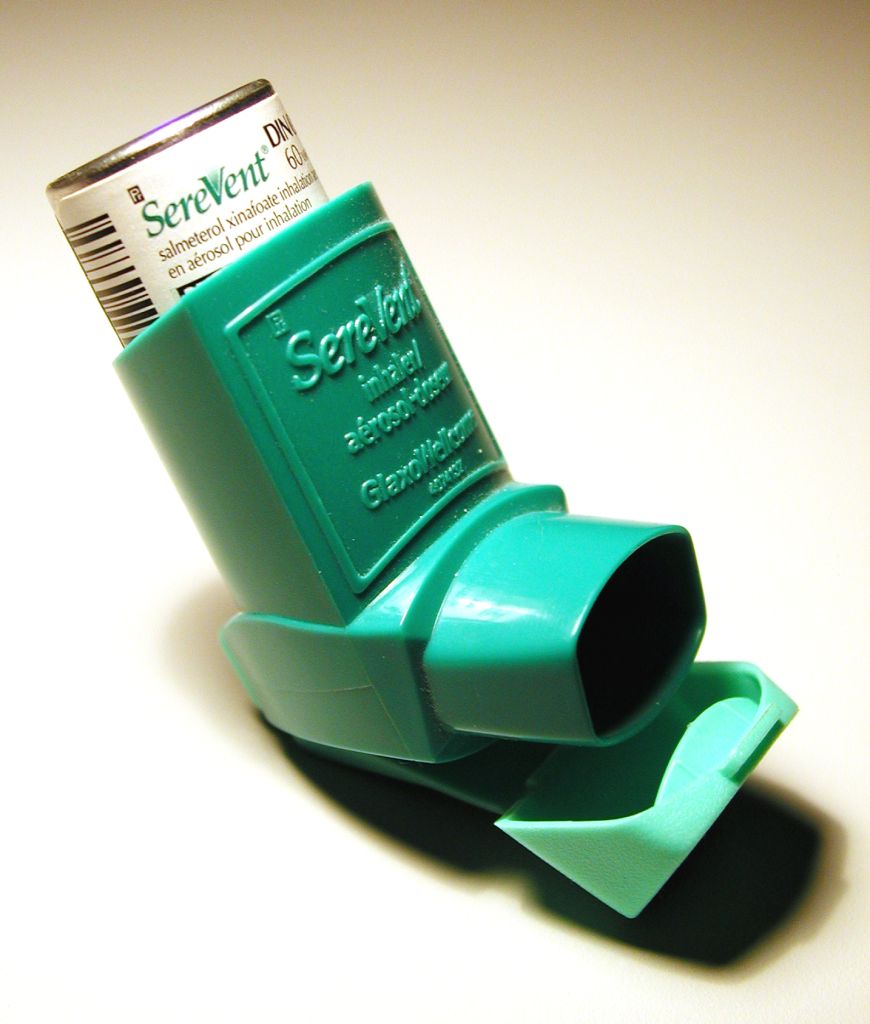
- Relax the muscles around the bronchioles
- Increase the heart rate
- Make the diaphragm contract to increase breathing
Associated with group of lung diseases
- COPD
- Emphysema
- Common colds
- Influenza
A client with chest tube has accidentally removed it. What should be done first?
- Lie the client down on the left side.
- Lie the client on the right side.
- Apply an occlusive dressing over the site.
- Reinsert the chest tube that fell out.
The bronchi (tube to the lungs) is divided into 2 __________ (left and right tubes). Each end of them have air sacs for gas exchange.
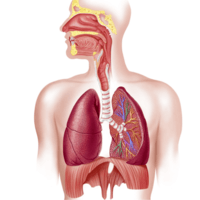
- bronchioles
The acessory muscles of the respiratory system are
- they are sternocledomastoid, platysma and scalene muscles of the neck
While auscultating a 65-year-old patient, the nurse hears bronchovesicular breath sounds over the lung fields. How does this nurse interpret this finding?
- Pulmonary consolidation
- This is a normal finding
- Bronchitis
- Pleural effusion
3. What is the compound in red blood cell?
- Oxyhaemoglobin
- Haemoglobin
- Haemogoblin
- Heamoglobin
A 49-year old client with cancer of the lung just had thoracentesis. The nurse would position the client:
- On the affected side
- On the unaffected side
- Semi-fowler's position
- On his back
Which of the following statements best describes ARDS?
- Alveoli are overdistended.
- Alveoli are fluid filled.
- Alveoli are filled with mucus secretions.
- Alveoli have increased perfusion.
Which of the following could be considered a pathogen?
- Dust
- Pollen
- Bacteria
Air enters __________, is filtered by hairs, warmed, moistened, and sampled for odors as it flows through a maze of nasal passages.
- NOSTRILS
Which are the main organs in the respiratory system?
- Heart
- Stomach
- Lungs
- Nose
common long term inflammatory disease of the airways of the lungs
- emphysema
- asthma
- pneumonia
- apnea
A person with Type AB+ blood has Rh antigens on their blood cells.
- True
- False
Inside the lungs, the bronchi divide into smaller tubes. At the end of these tubes, there are tiny air sacs called ______.
- uvula
- epiglottis
- bronchioles
- alveoli
Common cold is caused by a bacterial infection.
- TRUE
- FALSE
Which is/ are part/s of the respiratory system?
- esophagus
- alveoli
- red blood cells
- bronchus
Most of the time, the pathway for air is open, except when we swallow.
- TRUE
- FALSE
A client was admitted to the hospital with client chest pain and shortness of breath. Arterial blood gases were: pH=7.52, pCO2= 27, HCO3= 22. These values indicate:
- Respiratory alkalosis
- Respiratory acidosis
- Metabolic alkalosis
- Metabolic acidosis
A 40-year old male returned ti his room an hour ago following bronchoscopy. He is requesting for a glass of water. The nurse must first:
- Keep the client on NPO until an order is written.
- Check the vital sign.
- Check the gag reflex and swallowing reflexes.
- Encourage deep breathing and coughing.
what is the primary muscle for inhalation
- diaphragm
This is a tube about 12cm long with c-shaped rings of cartilage to keep it open
- Nasal cavity
- Trachea
- Mouth Cavity
- Pharynx
List down 2 components of the air we breathe in.
- [No Answer]
NUMBER 1:
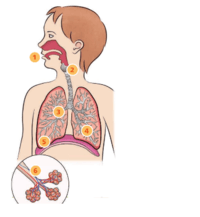
- lungs
- pharynx
- mouth
- alveoli
Other term for trachea is windpipe.
- TRUE
- FALSE
A 19-year old client comes to the emergency department with acute asthma. His respiratory rate is 44 bpm and he appears in acute respiratory distress. Which of the following actions should be taken first?
- Take a full nursing history
- Administer bronchodilator by nebulizer
- Provide emotional support to the client
- Administer oxygen 6L/m
The most comfortable position for the client with COPD is:
- Semi-Fowler's pisition
- Sitting upright leaning forward
- Lateral position
- High-Fowler's position
What are Cillia?
- Hair like structure in the lining of the respiratory System
Which part of the Respiratory System plays a major role in speech?
- nose
- pharynx
- larynx
- trachea
What muscle allows air to enter the trachea instead of the esophagus?
- Epiglottis
It is a type of chronic obstructive pulmonary disease where in the air sacs in the lungs become damaged and stretched.
- emphysema
- lung cancer
- pneumonia
- tuberculosis
The right lung has two lobes while the left lung has three lobes.
- TRUE
- FALSE
Which things should be observed during a community quarantine?
- wearing a mask
- bringing a dog at the mall
- social distancing
- sneezing on your hands
Air enters the body through the __?__
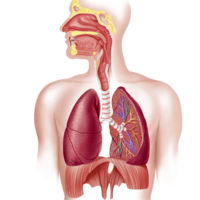
- Nose and Mouth
To keep up this site, we need your assistance. A little gift will help us alot.
Donate- The more you give the more you receive.
Related SubjectWalking Pneumonia: Causes and Trends
Northern Gaza Hospitals
Health and Human Services in Focus
Diabetes Education Month
Before and After School Care
Certified Nursing Assistant
Fundamentals of Nursing Practice
SpaceX Moon Landers
Planet Parade in the Night Sky
Space Exploration 2025
Parker Solar Probe's Historic Sun Approach
The Science of Snowflakes
The Importance of STEM Education
Quantum Computers
Oceans on Uranus and Neptune
Rapidly Feeding Black Hole Discovery
Beaver Moon in Science
Northern Lights: Science and Spectacle
Exploring the International Space Station
Exploring Space with SpaceX Falcon 9
The Taurids Meteor Shower: What You Need to Know for 2024
The Ancient History of Sunlight
Forensic Science
Engineering
Cannabis Science and Therapeutics
Science Technology and Society
Microbiology and Parasitology
Introduction to the Philosophy
Introduction to Psychology
Inorganic and Organic Chemistry
General Chemistry Organic
Environmental Science
Care of Mother Child Adolescent Well Clients
Community Health Nursing
Biochemistry
Biological Science
Biostatistics
Lung Cancer Screening Awareness
Nursing Interventions: Ineffective Breathing Pattern
Air Conditioning and Refrigeration Service
Refrigeration Service
Kitchen and Bath Specialty
Heating, Ventilation, Air Conditioning and Refrigeration
Norovirus Impact
Whooping Cough Outbreak in the United States
United States Bird Flu Outbreak
Understanding the Implications of the First US Bird Flu Case in a Pig
Public Health
Health Education
Healthcare Studies
Triple-Negative Breast Cancer
Seasonal Affective Disorder
How Wildlife Images Rehabilitation Operates
Physical Therapist Assistant
Psychology
Anatomy and Physiology
Show All Subject
Affiliate Links
Shopee Cashback Voucher
Temu $0 Shipping Fee
Amazon 75% Off Discounts